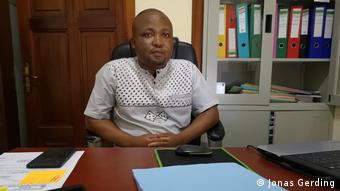Rare war crimes in Congo are documented as well as in the case of the Ex-rebels, the heads of Ntabo Ntaberi Sheka. But he is still influential. And the stuff provides the protection of justice to the test.

The burden of proof weighs heavy in the truest sense of the word. On more than 3000 pages of lawyers have compiled more than 250 testimonies to provide evidence of atrocities in Eastern Congo, the former rebel leader Ntabo Ntaberi Sheka is to be responsible. In the acts of war crimes, rape, looting, murder, and torture, as well as the recruitment of child soldiers. In addition, Sheka is accused of involvement in a terrorist Association.

Alain Lushule speaks for the victims ‘ lawyers
Up to the year 2010, the documented cases back, for which he will now be dragged before a military court in Goma, the provincial capital of Nord-Kivu to account. “This process has great importance,” says Alain Lushule, spokesman for the victims ‘ lawyers. “For the victims, it is a great relief, because we expect a compensation for all the offences committed by Sheka.”
13 Villages, 387 Rapes
Sheka is not the first rebel leader, is made in the Democratic Republic of the Congo the process. Rarely a militia have been put to so many crimes of which he has commanded, Nduma Defense of Congo (NDC). The UN human rights office has documented more than 387 cases of rape from the year 2010, the NDC attacked 13 villages in the Region of Walikale. Among the attackers also rebels of the so-called Democratic forces for the liberation of Rwanda (FDLR). The marsh also Nzitonda Séraphin of the FDLR is a complains in addition to Shekas Familiar Ndoole Batechi and his former comrades-in-arms Jean-Claude Lukambo.

In court, the Ex-rebel chief Sheka is distinguished by finer clothing of his co-defendants
Already in July 2017 had been Sheka in Goma, the UN, and sought him with an international arrest warrant. After almost one and a half years in detention, he was presented to the judges at the trial on 26. November in a chic suit and well-fed. A lawyer he can’t afford it, said he. Therefore, the negotiation on the 6 was. December adjourned. The competent military spokesman Guillaume Ndjike believes in the deterrent effect of the process: “This is actually a very, very strong Signal to all that are still in the jungle and our people to do Bad things to want. You know now that you will be tomorrow or the day after tomorrow to find Shekas again.”
Continuing Uncertainty
The security problem in the East of the Democratic Republic of the Congo will not solve the process. The project Kivu Security Tracker counted recently, more than 120 armed groups. Sheka is sitting behind bars. However, the population suffers from it’s former Mitkämpfern, which have organized themselves as the NDC-R under the leader Shimiray Mwissa Guidon.

Aristote Mbiula arrived for the process of Walikale
The 31-year-old environmentalist Aristote Mbula took the arduous route from Walikale to Goma, to track as a youth, representatives of the civil society in the process: “The Tribunal alone will not be sufficient, to the armed groups to reduce or even wipe out,” he says. Because many of the other Armed could make the Region more insecure.
The sporadic operations of the Congolese army are not enough, says Mbula, whose family was a victim of Shekas militia. It would take more than military force, for example, programmes for demobilization and a better future for the youth. Insignificant to the process, however, he says. “It would change something in the jungle, if the judiciary would be once really and Sheka is found guilty for what he’s accused of.” Conversely, a lenient sentence or an acquittal might strengthen the armed groups, however, even says Mbula.
Concern for the protection of witnesses
The still uncertain situation on the ground, the work of the victim an aggravating lawyers, says their spokesman Alain Lushule, because the witnesses did not feel safe: “There are some who say that Sheka still has influence in certain areas of Walikales.” The militias and their supporters might take their revenge on the witnesses, so the concern. For human rights activists, the help, the crime, are in danger. After threats had to be left alone within the past year, four of them in the Region, reported the Human rights organization Human Rights Watch.

The security precautions at the entrance to the military court are strictly
Youth representatives Mbula is angry that the process takes place in Goma. The journey through the unsafe area of Walikale to the provincial capital lasts for two days. The process, which could take a whole year, can track the victim. Can’t do it just trust in the judiciary, says Mbula: “Walikale would be a better place.”
In the neighboring province of South Kivu mobile courts were used, which went directly to the crime scenes traveled and the accused within a few weeks of the process. The lack of security in the case of Sheka would not allow, unfortunately, say the victims ‘ lawyers. And this Problem is likely to change this process to the next.